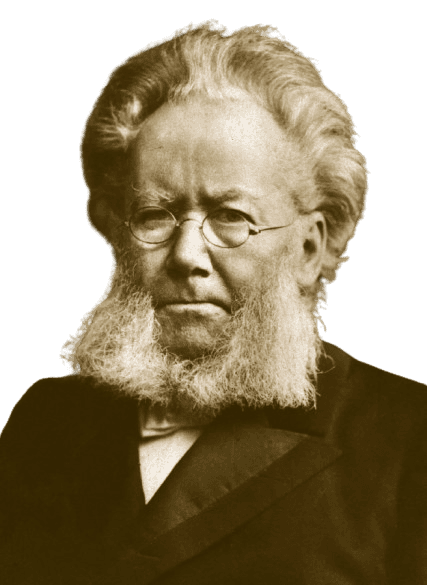Life and achievements
Early life
Henrik Johan Ibsen was born on March 20,20, 1828, in the small town of Skien in Norway. His father, Knud Ibsen, was a merchant, while Marichen Altenburg, his mother, belonged to a merchant family. The Ibsen family was well-off until Henrik's father's business went bankrupt when Henrik was eight, leaving the family in a poor state. This event significantly impacted the worldview and themes of Ibsen's works.
Ibsen left school at fifteen in 1843 and went to Grimstad to become an apprentice to an apothecary. At this time, he started writing plays and preparing for the university entrance examinations. His first play, "Catiline," published in 1850 under the pen name Brynjolf Bjarme, did not meet much success in society. Still, it was the starting point of Ibsen's career in literature and theatre.
Legacy
Henrik Ibsen is one of the most famous playwrights and a representative of world drama literature. He enriched the stage with realistic and psychological dramas that influenced many playwrights and authors. Ibsen's plays are still staged and performed worldwide, and his focus on social problems is still current. His influence is not only confined to literary works; he has also affected social ideas and cultural discourses.
Ibsen's works continue to be performed in different forms, such as films, television series, and operas. Places like the Ibsen Museum in Oslo are a clear testament to the fact that he is still remembered even today. Also, his critical analysis of society and people's conduct paved the way for the modernist and realist movements in the theater, thus cementing his status as a father of modern drama.
Join Confinity today to protect your digital privacy and take control of your online presence. Signup Now
Learn how historical figures leave behind lasting legacies that shape culture →
Milestone moments
Mar 17, 1850
Publication of "Catiline"
Ibsen's first play, "Catiline," was written in 1850 and published under the pen name Brynjolf Bjarme.
Though it was not a hit then, it signified the start of Ibsen's career as a playwright.
The play depicted elements of rebellion and the search for individuality that would be evident in most of his plays.
Nov 17, 1864
Move to Italy
In 1864, Ibsen relocated to Italy to get ideas and escape the conformity of Norway.
He had a very fruitful stay abroad and created some of his most well-known pieces of work, such as "Brand" and "Peer Gynt."
This enabled him to create his style and voice and express his views on society while being somewhat protected.
Dec 17, 1879
First Staging of the Play "A Doll's House"
"A Doll's House" was first performed at the Royal Theatre in Copenhagen in December 1879.
This play caused much controversy because it presented a rather pessimistic view of marriage and the roles of men and women in society, which is why it is considered one of Ibsen's most significant works.
It is now regarded as one of the most significant works in the evolution of contemporary drama.
Nov 17, 1881
Publication of "Ghosts"
"Ghosts" was written in 1881, and the play was met with much criticism for its topics of discussion, such as sexually transmitted diseases and incest.
Though banned and censored initially, the play has become a masterpiece, exposing the reality of society's Pharisaism.
"Ghosts" further enhanced Ibsen's reputation as a playwright unafraid to address the hitherto forbidden topics.
